- Home
- Kim Newman
Jago Page 12
Jago Read online
Page 12
The way she said it sounded like the name of a tacky brand of chocolates, nest d’or.
Allison Conway. Mr Friendly’s dark and usually silent daughter. She was often about, haunting the village like a junior spook. They had not spoken before. He guessed she was slightly retarded, or bright enough to pretend to be.
‘Hi, Allison. What can we do for you?’
She half turned, brushing her hair out of her face. Sunlight fell on pale skin. She had adult lips, thick and sensual.
‘Just looking, Paul. If that’s okay?’
He felt uneasy at the use of his name, as if shed stolen part of his soul. ‘Sure’ he said, trying to sound normal. ‘Do you get a discount?’
She smiled, pouting just a little. ‘Never have before.’ Safe behind his shades, Paul looked at her. Allison was between seventeen and twenty, and thin. Not thin: lean, agile, a feral child. Her filthy jeans had burst, not trendily, at the knees. She wore sturdy boots that could be registered as offensive weapons, and a fringed, worn-ragged Shane jacket a size too big. Not exactly a Thomas Hardy heroine.
She was examining him too, not bothering to be subtle about it. Suddenly she looked away, up toward the orchard. ‘Youm got hippies up the hill,’ she said, ‘they come last night.’
‘It’s not my hill.’
‘Just thought you’m want to know.’
Behind Allison, Paul could make out someone in the pottery, moving between the tables. He was far enough back to be indistinct. It must be a boy, he guessed, wearing a shabby leather jacket.
‘Sometimes hippies take things, chickens and that. Dad says they’m a menace.’
‘We don’t have any chickens. Just pots. And books.’
‘Ah.’ She smiled with a hint of malice. ‘Books.’
She picked up The World Set Free from a pile of volumes on the desk, and handled it strangely. Her wrist did not work properly as far as holding a book was concerned. Surely, she must be able to read. She made a face at the cover and put the Wells down again.
‘Not much use in books, if you ask me,’ she said. ‘Well, if things get bad you can eat them.’
She grinned, her teeth not good. ‘That’s true enough.’ He couldn’t tell if Allison was trying to flirt or pick a fight. Neither appealed. She took a strand of her hair and chewed it. It could have been Lolitaishly sexy, but her busy eyes made her seem the stereotype yokel strawsucker. She heaved her shoulders like Cagney, hitching her jacket open in front. Underneath, she wore only a black bra, the skin over her sternum dotted with blackheads. Madonna had a lot to answer for, he thought.
‘Who’s your friend?’ he asked.
She turned to the pottery and, for a moment, he thought she was going to claim not to see anyone. It was an M. R. James day, he decided. He had a maggoty writhing under his shirt, a mix of goose flesh and sweat.
‘That’s Ben,’ she said, after consideration. ‘He’s just come up.’
‘Oh, for the festival.’
‘Arr, that as well.’
He had the idea that Allison was teasing him. ‘As well as what?’
‘Other things,’ she said with a secretive smirk.
There was no sexiness in Allison’s pose now. If anything, there was menace. Paul wished her away, and started examining papers on his desk.
She got the message. ‘Must be going now,’ she said, trying to drop her accent and enunciate every syllable like Princess Di. ‘So delightful to have this little chat and all that, haw-haw. TTFN.’
She shrugged and walked away, rolling her hips, swinging her hair. He considered his quietly threatening typewriter. Glancing up, he saw Allison and Ben disappearing towards the road. He only got a glimpse of the boy’s face, and he had wild hair and large goggles to cover most of it. But one quarter-look was enough to give a lasting impression. Whether through birth, accident or design, Ben’s face was melted and set. That, he thought, was one ugly bastard.
7
The Maskell farm had survived bovine spongiform encephalopathy, ‘mad cow disease’, in 1990, through a savings lump that tided the business over the dip in the price of beef. Maskell could remember the Major, his father, battling foot-and-mouth in the 1960s, hard-facedly supervising the destruction of a fortune in cattle, his quirt dangling from his wrist. Even thirty years later, he couldn’t hear wind-carried gunfire without remembering that mass execution. After defeating plagues, it hurt to see the farm crippled not by an agricultural disaster but by a conglomeration of nothings in particular.
Figures scrolled up on his computer as he tried to hedge his way around the economic crunch. The dead cows, six so far, had collapsed with differing symptoms. Malnutrition, festering bites, dehydration, heat prostration, mystery bugs. Mainly, the cattle just upped stumps to get out of the sun. Fancy, Sue-Clare’s horse, was down with some weakening ailment, too. And Jethro, the Maskell dog, had taken to sleeping most of the time, hiding under a blanket in his basket. Jeremy blamed it on the Evil Dwarf.
And here he was, indoors, staring at a screen, struggling with the books. There was nothing he could do outside. The rump of his workforce were trying to limit damage, clearing the way for the Agapemone people to move in over the next few days. After that, he might as well take a holiday and wait it out. Eventually, it must rain. Then, maybe, he could start all over, scratching the land.
He had all electric fans on, but they were not helping. His face was hot and damp, his shirt stuck to his back. He had drunk an entire bottle of Perrier water and not needed to use the toilet.
The summer was a write-off. New diseases kept cropping up. Whole herds were being slaughtered in neighbouring counties. The price of British beef was at an all-time low, worse than in 1990. Because a few kids in Northampton had developed a new allergy, British milk was suspect, too. People up and down the country were nervous about eating anything with ‘Produce of Britain’ printed on it. The minister of agriculture tried to show his confidence in British foods by demonstrating he could feed his extended family on an all-British menu for a traditional Sunday dinner. The farming industry reeled when the Sunday newspapers ran pictures of the minister’s twelve-year-old daughter sicking up British milk pudding down her best photo-opportunity frock.
His only hope for survival was the Agapemone, no matter what Danny Keough might say. In previous years, he’d remained neutral on the festival, fence-sitting while Danny got up his petitions and the outsiders rushed in. Sue-Clare and some of her New Age friends had dragged him along last year, and it had not been so bad. Not all the music was godawful shite. And Douggie Calver, the cider king, swore by the profits he could reap over the week. Before throwing in with the festival, Maskell had a long talk with Douggie. He’d been astonished, and a little appalled, to realize how much money floated around in ragged jeans pockets. Some of it might as well come his way, even if it meant Danny never spoke to him again. That wasn’t much of a loss. The old soldier was getting ever more cranky, and was bound to burst a blood vessel soon.
In the corner of the office, a pyramid space that had once been a hayloft, Jeremy sat with a book, uncharacteristically quiet. Sue-Clare was off in Taunton with her crystal therapist. Since it was the long school holidays, Maskell was stuck with the kids. Hannah was no trouble at all. Stick her in front of the video with Teenage Mutant Ninja Turtles 2 and she was content on her own. But Jeremy, who became bored with deadly ease, was working up to trouble. Now he was fine, but Maskell sensed harassment coming. His son had a concentration problem. Then again, he himself could hardly keep his mind on his home computer’s columns of figures. In this weather, it was hard to think about one thing for any length of time.
At first, the heat had been pleasant. He had gone about with his shirt off, and Sue-Clare complimented him on his tan. Unlike some of his labourers, who had permanently bark-textured brown necks and fishbelly-white backs and chests, he did not burn. They ate long, picniclike meals in the open, and stayed outside late into the evenings. Sue-Clare enjoyed herself, browning her st
omach and sipping cooled white wine or riding across the moors on Fancy, and patiently shushed his dark grumbles about the weather not being good for the farm. One day, everything had gone beyond ripe and started to rot. Since then, it had been Hell.
Maskell exited one file and entered another, checking running totals. The shortfall between expected and actual income was dangerous.
Jeremy sighed and put down The Lion, the Witch and the Wardrobe. Officially, he was a gifted child, but somehow that wound up being an affliction. He had a relationship problem, which meant other kids at his school did not like him. Two or three times a week, they formed a circle around him in the playground and jeered at him until he cried. Lisa Steyning, the angelic tyrant who owned the dinner break, was the ringleader. Maskell couldn’t remember much of his own primary-school days, but was certain he had never been such a drip. If anything, he’d have been in the ring, linking arms with the others, chanting ‘Jerm, Jerm, Jerm, Swallowing Sperm’ at the cry-baby twerp.
Jeremy zigzagged slowly across the room, fiddling with things. Maskell knew he was about to need attention. He tried to stop himself getting angry before the boy had done anything. Jeremy was demanding more and more adult attention. Sue-Clare was dropping the phrase ‘special school, but Maskell thought Jeremy’s inability to make friends with kids his own age was not just a matter of differing levels of intelligence. In many ways, he seemed a lot less intelligent than the rest of them. He was so clever he had to do really stupid things to keep up. Like the time he smeared garlic on his windows to keep away the Evil Dwarf.
Jeremy was behind him, visible dimly as a reflection in the screen.
There was the concentration problem. The relationship problem. The night-time bladder-control problem. The coordination problem. The bad-dream problem. And the Evil Dwarf problem. The Evil Dwarf was Jeremy’s bogeyman, a creeping malevolence who sucked out the minds of little boys, turning them into human sheep. It was hard to tackle the things that scared Jeremy. Controlling his reading and viewing didn’t help, because Jeremy could take it into his head to be scared of almost anything. When they took the kids to see Snow White, Maskell had predicted trouble with the Wicked Queen but Jeremy had taken it into his head to be afraid of Dopey. Maskell could not remember now whether the Evil Dwarf had showed up before or after Dopey, but they were now the same monster. No wonder the other kids, including five-year-old Hannah, gave him a hard time. Anyone afraid of Dopey had a serious chicken streak.
When he was a boy, they’d had really scary monsters, like the Quatermass Experiment and the Trollenberg Terror. And he’d never shown his fear of them before his father. If he’d refused to go alone to bed in the dark, the Major would have given him a memorable quirting and banned him from the television.
Maskell was struggling anyway. Since the books had gone from paper to disc, things supposed to be simple had become complicated. He trawled around in the accounts, trying to find enough to meet the tax bill. He was required to pay for last year’s profits while the farm was in its worst-ever slump, but he had been digging for two months into the set-aside tax money to keep up with the wage bills. Losing Budge and Gilpin helped—although their union rep had already left a curt message on his answering machine—but not much. He had no casual labour left to trim from the budget. Gilpin and Budge hadn’t been fat, they’d been meat; and their loss left a bloody hole.
To top it off, his accountant of eighteen years had retired, and Maskell resented and mistrusted the ponytailed youth who inherited his business. He did not like the way he looked at Sue-Clare’s chest and constantly flexed his fingers, and could not understand the manual that came with the software the sharpfaced creep had lent him.
‘Dad,’ said Jeremy in the whiny voice he always used when he was about to ask an unanswerable question.
Maskell entered the housekeeping account, hoping Sue-Clare had left something he could use to fill in a financial crack.
‘Daaaad?’
‘Yes, Jeremy?’
‘Dad, what’s scary for you?’
It was a favourite question. Since so many of the child’s problems had to do with what scared him, he was fascinated by the subject. Hannah was scared of spiders, things Jeremy recognized as harmless animals. After all, why bother being afraid of nonpoisonous creepy-crawlies when you had an Evil Dwarf to worry about? Realizing scariness was inherent in people who were scared, not in things that were scary—just like the varying taste in foods that made him love parsnips, which his sister would rather go hungry than eat—he was interested in what was scary for other people.
Maskell had been asked before, many times, and settled on an answer. ‘Jerm,’ he said, ‘the only thing that scares me is stupidity.’
‘Um,’ said Jeremy, thinking. ‘Um.’
8
She had lived in south London until she was ten, and in Hove ever since. Used to streets and seafronts, this was the first time she’d been away from buses every ten minutes, shops round the corner, cinemas and parties and clubs within walking distance, and being able just to go into the town centre and run into people she knew. Here, apart from Paul, she was on her own. Her ideas of the country had come from The Archers and television serials about bodice-ripping in olden times. The reality was heat and insects, the whiff of silage, dusty earth that got tracked everywhere. And the quiet: you heard every car that passed, but there was no constant background buzz of traffic. Even the birds were less raucous than the seagulls which flocked on Brighton beach.
Hazel was surprised it was easy to find her way over the hill back to the Pottery. The directions she’d been given were vague, but the paths were clear. She’d expected to get lost in a jungle, but this wild wood was open and sunny. Until now, she’d been too busy to explore. Up here she could get an idea of where places in the village were in relation to each other. This might be her only chance in all her life to live in the country; she shouldn’t waste it all bent over a wheel or complaining about the lack of a Chinese takeaway. From some of the hillside clearings, the views were pretty. There was a bump on the horizon, sticking a finger into the sky, Glastonbury Tor. Paul said it was one of the places King Arthur was supposed to be buried. Nearer, she saw the Church out on the moor, cows standing like toys in yellow fields. With straight ditches and winding roads like lines, it was like looking down on a map.
She’d given herself a turn or two last night, on her way out to the kiln shed with her torch, imagining strange shapes in the shadows of trees and the outbuildings. It was a different dark, with no underglow from street lighting. Now, with the sun high, that was a distant memory. It was cooler up here, with shade from the trees and a slight wind. No wonder those kids camped up here. It was like being above the world.
It had done her good to get away for a morning and most of an afternoon. Paul was right, she’d been working too hard, knocking herself out. If she was tense, she messed up her pots. After only a few hours of wandering, the pains in her lower back faded. Backache was an occupational handicap for a potter, for ever bent over a wheel, humping heavy boards of work about. Was that really something she wanted to take on for life? Was she really good enough to make it worth the effort? Yesterday, last night, this morning, she hadn’t thought so. It wasn’t too late, she knew, to change; move into the teaching stream, even switch completely and take computer courses. Today, with the sun up, the bottles abandoned and a kiln waiting to be unpacked, she was beginning to feel good about it again. Her hands felt competent. She was even looking forward to unpacking the kiln this evening. It would be a discovery.
There weren’t so many insects up here. She hadn’t been bitten all day. She found herself a spot that overlooked the Pottery. She could see Paul. A few people (customers?) came and went. Paul saw to them. Someone had left a pair of old binoculars hanging on a dead bush. She tried them out, but all she saw through them was a fuzzy blur.
She’d been moody lately. Paul was scratching against her, getting sarky when she didn’t need it, making ha
lf-apologetic demands. They shared the cooking equally, but she always ended up loading the dishwasher. And she did the ironing. Patch had wanted her to join a women’s group this spring, but she had been busy, been sidetracked, with Paul. Maybe when they got back, she’d have time. Hazel wasn’t sure Paul would last through the autumn. It wasn’t that she didn’t love him, it was just… She didn’t know, just he could be so miserable at times.
He looked small now, working at his desk. His typewriter chattered like a tiny woodpecker. Every so often, he would stop tapping and rummage through his piles of books. There were more things than books, Hazel thought. More things to do. This was the first relationship she’d been in where she’d had to think beyond the next stay-over, the next day out. But that wasn’t necessarily a sign this was the Big One. She didn’t believe in lifelong love affairs, anyway. When Paul had been away lecturing in Manchester last term, she’d missed him fiercely, had read and reread ragged his letters. She hadn’t wanted to do much of anything, go out with Patch or her friends. She’d even read some of Paul’s books, to try to get close to him. But shed caught a bug of some kind and felt nauseous. Then her period was late, and she’d known, with a terrible certainty, that she was pregnant.
She waved to Paul. He didn’t notice.
During the Week of the Baby, she’d thought through the life they might be stuck in. Paul would want the child, would insist that he could help her, and she’d give in. But he’d go forward while she’d come to a halt. She’d take time off to have the baby, and never get back to her courses. Maybe they’d get married. Dad would give them both what for if they didn’t. Then they’d find they didn’t have the money to get a mortgage on a house or flat big enough for a family. And childbirth, she knew, would be an agony. She loved Paul, yes, but did she love him enough to fit into that kind of life? Did she love him enough to end up like Mum, stuck with order-barking Dad?

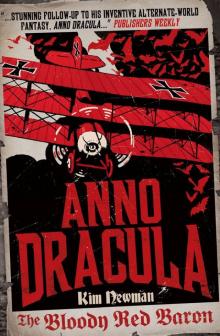 The Bloody Red Baron
The Bloody Red Baron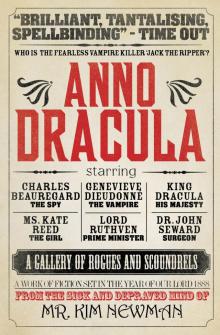 Anno Dracula
Anno Dracula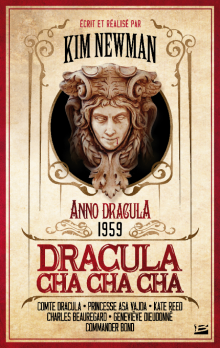 Dracula Cha Cha Cha
Dracula Cha Cha Cha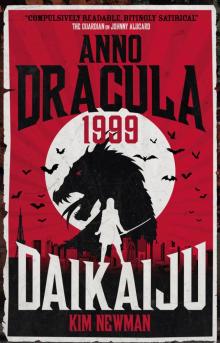 Anno Dracula 1999
Anno Dracula 1999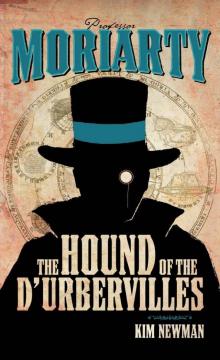 Moriarty: The Hound of the D'Urbervilles
Moriarty: The Hound of the D'Urbervilles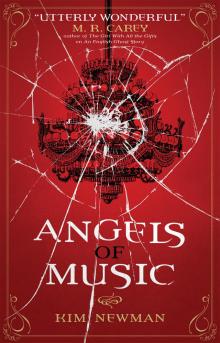 Angels of Music
Angels of Music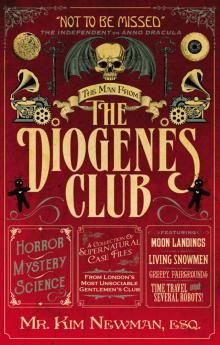 The Man From the Diogenes Club
The Man From the Diogenes Club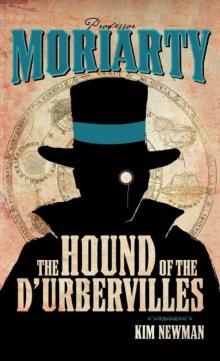 Professor Moriarty: The Hound Of The D’urbervilles
Professor Moriarty: The Hound Of The D’urbervilles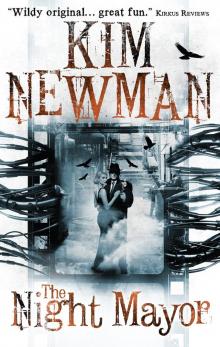 The Night Mayor
The Night Mayor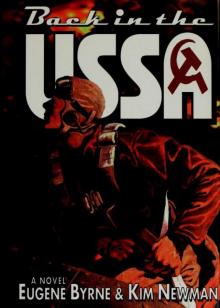 Back in the USSA
Back in the USSA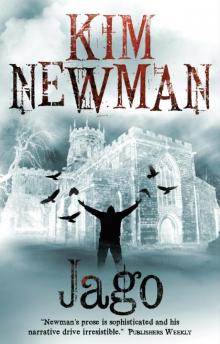 Jago
Jago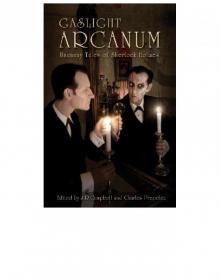 Gaslight Arcanum: Uncanny Tales of Sherlock Holmes
Gaslight Arcanum: Uncanny Tales of Sherlock Holmes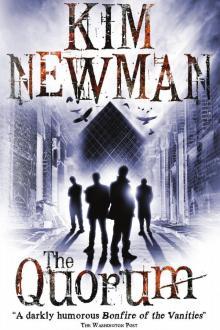 The Quorum
The Quorum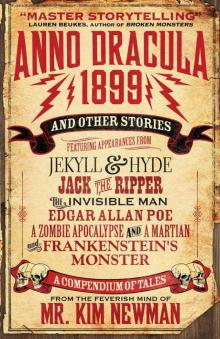 Anno Dracula 1899 and Other Stories
Anno Dracula 1899 and Other Stories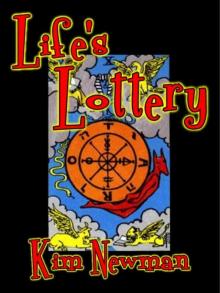 Life's Lottery
Life's Lottery The Secrets of Drearcliff Grange School
The Secrets of Drearcliff Grange School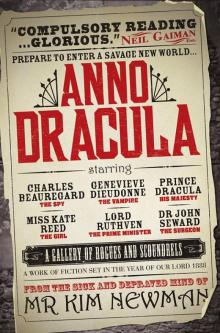 Anno Dracula ad-1
Anno Dracula ad-1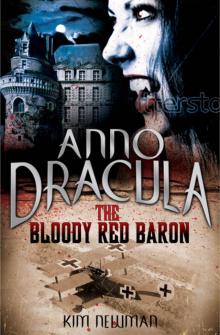 The Bloody Red Baron: 1918 ad-2
The Bloody Red Baron: 1918 ad-2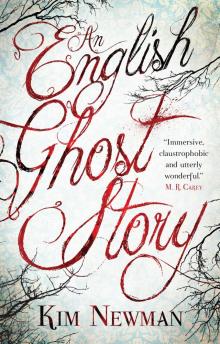 An English Ghost Story
An English Ghost Story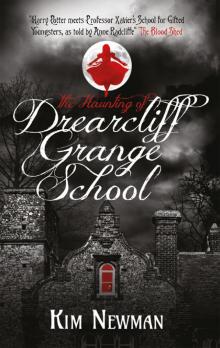 The Haunting of Drearcliff Grange School
The Haunting of Drearcliff Grange School The Other Side of Midnight
The Other Side of Midnight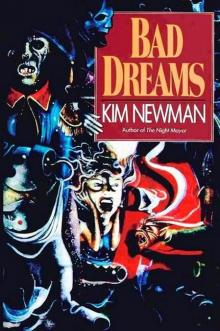 Bad Dreams
Bad Dreams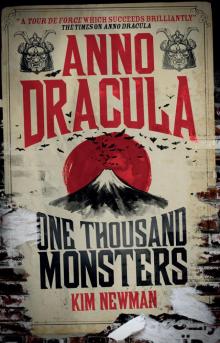 Anno Dracula--One Thousand Monsters
Anno Dracula--One Thousand Monsters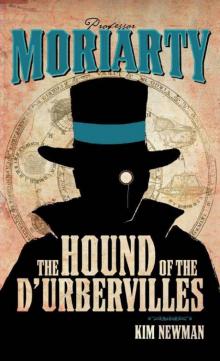 The Hound Of The D’urbervilles
The Hound Of The D’urbervilles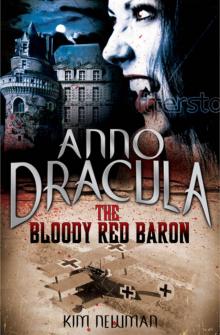 The Bloody Red Baron: Anno Dracula 1918
The Bloody Red Baron: Anno Dracula 1918